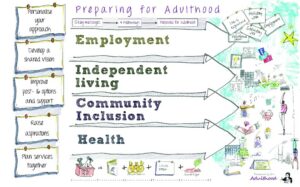Howard, Occupational Therapist (OT) works mainly with older children at Cognus Therapies (year 9 and above). As part of the annual review process, Howard calls parents and carers to talk about how their child is managing at school, at home and in the community, including the ‘Preparation for Adulthood’ agenda and the skills involved in this. While there are a range of topics that are discussed, one area that is consistent in most calls is around how they can support their child to develop their skills.

Some children and young people cope with learning a range of complex or simple tasks, some struggle with the idea of learning one, so pick wisely.
You can support children and young people by giving them the following strategies:
-
-
- Verbal prompts: These can be whole instructions or just a hint. Only give what is necessary for them to complete the task and maintain motivation.
-

-
-
- Visual prompts: pictures which remind them or help them to understand what they need to do next. This could be a photograph of the actual object or a picture which represents it, depending on which they can understand better.
-
-
-
- Hand over hand: This is where you might physically guide them to the correct position for a part of the task or throughout the whole task.

- Hand over hand: This is where you might physically guide them to the correct position for a part of the task or throughout the whole task.
-
-
-
- You should always work towards doing less for them, work towards independence.
-
Doing a ‘Just Right’ Challenge:
- This is where a task is made to be achievable enough for them to feel they can do it, and challenging enough to repeat and perfect the skill, or stretch their ability.
Grading them:
- Where a task is made easier, they feel more able to complete it successfully. For example, using a microwave instead of a hob/oven, due to concerns with safety awareness. Giving them the opportunity to chop softer foods rather than harder foods initially. As their ability increases you can increase the challenge
Forwards chaining
- Allowing them to start the task, but you finish it for them. Next time either practice and perfect the skill or allow them to complete more of the task, if they are ready. Repeat until they are able to complete the whole task.
Backwards chaining:
- Get them to start towards the end of the task so they are able to finish it, give them plenty of praise. Praise is important. Next time either repeat what they did before or start a little further towards the beginning, so this time they complete more of the task, praise them. Keep repeating until they are able to complete the whole task.
Home management:
- Give them a job or more, depending on what they agree to and suggest they carry out on the same day and similar time each week.
- You may want to draw up a weekly planner to help them remember and stay accountable.
- Over time as their tolerance allows add more jobs to do. Try to find the jobs that they enjoy and help them feel they have important roles in the home.
- Taking part in home management is likely to help them to feel a part of the home, working towards independence.
We hope you found our strategies towards Preparing for Adulthood helpful! Check out more about Preparing for Adulthood in Sutton here: Preparation for Adulthood – Sutton Council

